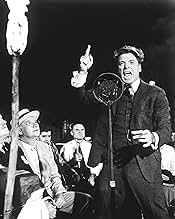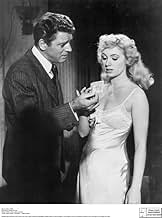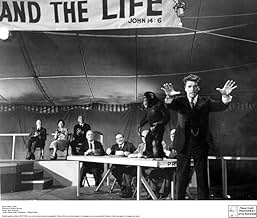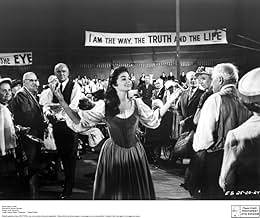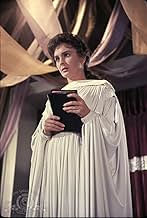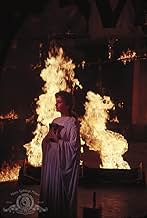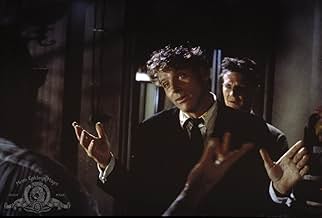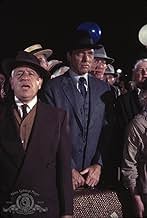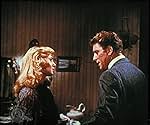A charming con man joins an itinerant evangelical sister who travels the American Midwest taking advantage of gullible locals in the 1920s.A charming con man joins an itinerant evangelical sister who travels the American Midwest taking advantage of gullible locals in the 1920s.A charming con man joins an itinerant evangelical sister who travels the American Midwest taking advantage of gullible locals in the 1920s.
- Director
- Writers
- Stars
- Won 3 Oscars
- 11 wins & 14 nominations total
Edward Andrews
- George F. Babbitt
- (as Ed Andrews)
Harry Antrim
- Salesman in Saloon
- (uncredited)
Larry J. Blake
- Mac - Bartender
- (uncredited)
Phil Bloom
- Cornerman
- (uncredited)
Paul Bradley
- Congregation Member
- (uncredited)
- Director
- Writers
- All cast & crew
- Production, box office & more at IMDbPro
7.714.1K
1
2
3
4
5
6
7
8
9
10
Featured reviews
Sin, sin, sin! You're all sinners! You're all doomed to perdition!
Based on the muckraker Sinclair Lewis' novel, and superbly translated to the screen by Richard Brooks (In Cold Blood , The Professionals, Cat on a Hot Tin Roof), this story of huckster-ism by religion is a masterpiece.
Burt Lancaster player the greatest role of his career, getting his only Oscar for his performance. Lancaster, so good in such films as From Here to Eternity, Atlantic City, and Seven Days in May, was spellbinding as the salesman for God.
Shirley Jones (The Music Man, "The Patridge Family," was simply delicious as Gantry's first conquest, and now a "five-buck hooker," that he left behind: "Oh, he gave me special instructions back of the pulpit Christmas Eve. He got to howlin' "Repent! Repent!" and I got to moanin' "Save me! Save me!" and the first thing I know he rammed the fear of God into me so fast I never heard my old man's footsteps!" 1960 was a great year for movies, and this was certainly one of the best of that year, and one of the best of all time. If you want to see real acting, this film should be on your "must-see" list.
Burt Lancaster player the greatest role of his career, getting his only Oscar for his performance. Lancaster, so good in such films as From Here to Eternity, Atlantic City, and Seven Days in May, was spellbinding as the salesman for God.
Shirley Jones (The Music Man, "The Patridge Family," was simply delicious as Gantry's first conquest, and now a "five-buck hooker," that he left behind: "Oh, he gave me special instructions back of the pulpit Christmas Eve. He got to howlin' "Repent! Repent!" and I got to moanin' "Save me! Save me!" and the first thing I know he rammed the fear of God into me so fast I never heard my old man's footsteps!" 1960 was a great year for movies, and this was certainly one of the best of that year, and one of the best of all time. If you want to see real acting, this film should be on your "must-see" list.
And there was light.....9/10.
And there was light---9/10.
All you need to know about the character of Elmer Gantry is neatly summed up in the first 10 minutes of the film. The film opens as we see Gantry holding court around a table in a bar, telling jokes and anecdotes of sexual conquests one minute, and then the next minute is helping out two wayward parishioners by passing the hat around the bar and preaching in earnest the word of God. Lancaster plays out the duality in the role of Gantry as everyman/ preacher brilliantly throughout the film. We're witness to his meteoric rise within the ranks of the religious road show, we see his stumbles within those ranks and his eventual fall from popularity to an even more impossible grace under fire (literally), but most importantly we see the ability of his character to serve both his rise and fall in ways truly unexpected.
Gantry finds that there are many who will listen to him wax eloquent on the bible. But when Gantry sees Sister Sharon Falconer (as played by Jean Simmons) he forgets about getting closer to the lord and decides to ingratiate himself into her 'inner circle'. Gantry can see that the 'old time religion show' is a soul saver on Sunday, but quite a moneymaker on Monday. There are 'two very different' Gantry's, the one who has a lifetime of sexual anecdotes and the other who's true love is for the bible. What we are not in store for is the third Gantry; the one in love with Elmer Gantry and his own voice. In any case, Gantry sees a golden opportunity to satisfy all three Gantry's and he goes for it. Through his ability to con and sweet talk his way to the top, Gantry makes all of the right friends and maneuvers himself to a spot underneath Sister Sharon Falconer.
Gantry's fall comes in the form of Lulu Baines (as played by Shirley Jones), a prostitute with a past history with Gantry. As Gantry's popularity on the 'road show' circuit starts to hit its zenith, Baines appears into Gantry's life once again as she sets up Gantry for blackmail. How Gantry deals with Baines and the loss of trust from Sister Sharon is one of the best moments from the film. And although her time on screen doesn't come close to matching that of both Lancaster and Simmons, it is the performance of Jones in one scene that practically steals the show. Jones' speech to the ladies in the brothel about Gantry "Ramming the fear of God so fast" into her was exhilaratingly fun and mildly erotic. I would think it was largely this scene that got her noticed by the Academy in 1960.
However great Lancaster is as Gantry (Oscar winning performance) and spectacular Jones is as Baines (another Oscar winner), let us not forget how easy it would have been for this movie to have THREE Oscar WINNERS!!! Yes, Jean Simmons was robbed by the Academy that year. I think there are at least three reasons as to why Jean Simmons was not given the Oscar that year. One is the brutally lame ending to the movie. Sister Sharon is left to walk about the fiery inferno of her newly built church, while everyone around her is knocking her to the ground trying to escape. Sister Sharon is oblivious to human stampedes and is more concerned in urging everyone to remain calm. A performance that must not have been lost on John Landis when he made Kevin Bacon reprise it in 'Animal House' some 18 years later (sans the fire). It was a shame to see her babbling like an idiot while certain death surrounded her. That's one reason, but the other two reasons are probably more to the truth. You see, Jean Simmons wasn't the only actress who can claim to have been robbed on Oscar night, so could Shirley Maclaine. The Oscar could have gone to either one, but if it had gone to Jean Simmons, The Academy would've had a hard time giving any award to the 'The Apartment' or its director Billy Wilder. How could 'Elmer Gantry' win three of the four main awards yet not walk away with the Best Picture? It's also been said the Academy felt bad for Elizabeth Taylor as she was not only recovering from the recent death of her husband, Michael Todd, but also that she had just needed an emergency tracheotomy only weeks before the awards. However, one point should be clear, Elizabeth Taylor never should have won the Oscar over the performances that year from Simmons or Maclaine.
Another performer from the movie who gives a great performance is Arthur Kennedy as Jim Lefferts. Lefferts is the skeptical newsman who follows the 'road show' waiting to see a miracle or perhaps to see many a false prophet fall. One scene that stands out is the scene where Lefferts is dictating an article on the exploits of Lancaster and Simmons' religious road show. While he is dictating he is also absent-mindedly sharpening a pencil. As Lefferts comments become to take on more of a cynical tone, the pencil in his hand also becomes sharper. Once Lefferts is through with his thought, the pencil has been sharpened to a fine point and his thoughts are ready for print. He writes, "Is it a church, is it a religion or is it a circus sideshow complete with freaks, magic and rabble rousing?
This is a fine film with a slightly disappointing ending. I can't accept that the errant fling of a cigarette can flash through the heavens like a message from God, but if ever a bolt of lightning was captured onto the silver screen, it was the bolt from Burt Lancaster as Elmer Gantry. 9/10.
Clark Richards
All you need to know about the character of Elmer Gantry is neatly summed up in the first 10 minutes of the film. The film opens as we see Gantry holding court around a table in a bar, telling jokes and anecdotes of sexual conquests one minute, and then the next minute is helping out two wayward parishioners by passing the hat around the bar and preaching in earnest the word of God. Lancaster plays out the duality in the role of Gantry as everyman/ preacher brilliantly throughout the film. We're witness to his meteoric rise within the ranks of the religious road show, we see his stumbles within those ranks and his eventual fall from popularity to an even more impossible grace under fire (literally), but most importantly we see the ability of his character to serve both his rise and fall in ways truly unexpected.
Gantry finds that there are many who will listen to him wax eloquent on the bible. But when Gantry sees Sister Sharon Falconer (as played by Jean Simmons) he forgets about getting closer to the lord and decides to ingratiate himself into her 'inner circle'. Gantry can see that the 'old time religion show' is a soul saver on Sunday, but quite a moneymaker on Monday. There are 'two very different' Gantry's, the one who has a lifetime of sexual anecdotes and the other who's true love is for the bible. What we are not in store for is the third Gantry; the one in love with Elmer Gantry and his own voice. In any case, Gantry sees a golden opportunity to satisfy all three Gantry's and he goes for it. Through his ability to con and sweet talk his way to the top, Gantry makes all of the right friends and maneuvers himself to a spot underneath Sister Sharon Falconer.
Gantry's fall comes in the form of Lulu Baines (as played by Shirley Jones), a prostitute with a past history with Gantry. As Gantry's popularity on the 'road show' circuit starts to hit its zenith, Baines appears into Gantry's life once again as she sets up Gantry for blackmail. How Gantry deals with Baines and the loss of trust from Sister Sharon is one of the best moments from the film. And although her time on screen doesn't come close to matching that of both Lancaster and Simmons, it is the performance of Jones in one scene that practically steals the show. Jones' speech to the ladies in the brothel about Gantry "Ramming the fear of God so fast" into her was exhilaratingly fun and mildly erotic. I would think it was largely this scene that got her noticed by the Academy in 1960.
However great Lancaster is as Gantry (Oscar winning performance) and spectacular Jones is as Baines (another Oscar winner), let us not forget how easy it would have been for this movie to have THREE Oscar WINNERS!!! Yes, Jean Simmons was robbed by the Academy that year. I think there are at least three reasons as to why Jean Simmons was not given the Oscar that year. One is the brutally lame ending to the movie. Sister Sharon is left to walk about the fiery inferno of her newly built church, while everyone around her is knocking her to the ground trying to escape. Sister Sharon is oblivious to human stampedes and is more concerned in urging everyone to remain calm. A performance that must not have been lost on John Landis when he made Kevin Bacon reprise it in 'Animal House' some 18 years later (sans the fire). It was a shame to see her babbling like an idiot while certain death surrounded her. That's one reason, but the other two reasons are probably more to the truth. You see, Jean Simmons wasn't the only actress who can claim to have been robbed on Oscar night, so could Shirley Maclaine. The Oscar could have gone to either one, but if it had gone to Jean Simmons, The Academy would've had a hard time giving any award to the 'The Apartment' or its director Billy Wilder. How could 'Elmer Gantry' win three of the four main awards yet not walk away with the Best Picture? It's also been said the Academy felt bad for Elizabeth Taylor as she was not only recovering from the recent death of her husband, Michael Todd, but also that she had just needed an emergency tracheotomy only weeks before the awards. However, one point should be clear, Elizabeth Taylor never should have won the Oscar over the performances that year from Simmons or Maclaine.
Another performer from the movie who gives a great performance is Arthur Kennedy as Jim Lefferts. Lefferts is the skeptical newsman who follows the 'road show' waiting to see a miracle or perhaps to see many a false prophet fall. One scene that stands out is the scene where Lefferts is dictating an article on the exploits of Lancaster and Simmons' religious road show. While he is dictating he is also absent-mindedly sharpening a pencil. As Lefferts comments become to take on more of a cynical tone, the pencil in his hand also becomes sharper. Once Lefferts is through with his thought, the pencil has been sharpened to a fine point and his thoughts are ready for print. He writes, "Is it a church, is it a religion or is it a circus sideshow complete with freaks, magic and rabble rousing?
This is a fine film with a slightly disappointing ending. I can't accept that the errant fling of a cigarette can flash through the heavens like a message from God, but if ever a bolt of lightning was captured onto the silver screen, it was the bolt from Burt Lancaster as Elmer Gantry. 9/10.
Clark Richards
"You're all sinners! You'll all burn in hell!"
"Elmer Gantry" is an amazing film that does not seem dated at all, having lost none of its bite or appeal with the passing of time. Taken from the classic Sinclair Lewis novel of the same name, director Richard Brooks garnered an Oscar for Best Screenplay for his adaptation, and Burt Lancaster won his sole Best Actor Oscar for his performance as Elmer Gantry. Gantry is an over-the-top opportunistic traveling salesman who teams up with evangelist Sister Sharon Falconer (Jean Simmons) to promote religion in 1920's America. Gantry turns out to be the perfect publicity compliment to Sister Sharon, who, unlike him, is a true believer. Where she is quiet and gentle with her manner of preaching, he is all fire and brimstone, literally throwing himself about the audience and inflaming them into repentance.
Burt Lancaster commands the screen: all flashing teeth, athletic energy, charisma, and wild hair, using his own physical prowess to great advantage. The angelic and lovely Jean Simmons, who had legions of adoring male fans when she was in her ethereal prime, portrays Sister Sharon (loosely based on a well-known real-life revivalist of the early 1920's, Aimee Semple McPherson, about whom I'd heard from my grandmother) in a manner reminiscent of her character in "Spartacus" - she was the perfect choice for this role, as was Lancaster for his.
Shirley Jones was awarded the Best Supporting Actress Oscar for her lively portrayal of prostitute Lulu Bains, whose past history with Gantry comes back to haunt him, with some of the best lines in the film - gleefully laughing as she dances about a room full of her fellow prostitutes, she recounts that "He rammed the fear of God into me so fast I never heard my old man's footsteps!" Watching Burt Lancaster in his prime use his athletic ability (he was a circus acrobat before he became an actor) and physical grace helps make his performance truly electrifying. And he also manages to believably evolve Elmer Gantry from loud-mouthed salesman to a sympathetic and honest human being over the course of the film.
The top-notch supporting cast includes Arthur Kennedy, Patti Page, Dean Jagger, and John McIntire.
Burt Lancaster commands the screen: all flashing teeth, athletic energy, charisma, and wild hair, using his own physical prowess to great advantage. The angelic and lovely Jean Simmons, who had legions of adoring male fans when she was in her ethereal prime, portrays Sister Sharon (loosely based on a well-known real-life revivalist of the early 1920's, Aimee Semple McPherson, about whom I'd heard from my grandmother) in a manner reminiscent of her character in "Spartacus" - she was the perfect choice for this role, as was Lancaster for his.
Shirley Jones was awarded the Best Supporting Actress Oscar for her lively portrayal of prostitute Lulu Bains, whose past history with Gantry comes back to haunt him, with some of the best lines in the film - gleefully laughing as she dances about a room full of her fellow prostitutes, she recounts that "He rammed the fear of God into me so fast I never heard my old man's footsteps!" Watching Burt Lancaster in his prime use his athletic ability (he was a circus acrobat before he became an actor) and physical grace helps make his performance truly electrifying. And he also manages to believably evolve Elmer Gantry from loud-mouthed salesman to a sympathetic and honest human being over the course of the film.
The top-notch supporting cast includes Arthur Kennedy, Patti Page, Dean Jagger, and John McIntire.
A remarkable movie
I give this movie a 10 only because there is nothing above that.
I first saw this movie as a kid on TV not that long after it came out. It hasn't aged one bit. That it came out the same year as Inherit the Wind, another masterpiece, is interesting but not surprising. Hollywood was turning the spotlight on the dangers of religious fundamentalism that have since become far more powerful in this country.
Everything about this movie is first rate. Lancaster's acting isn't acting; it is better than that. He simply becomes Gantry, and you believe in him - as he believes in himself, from time to time - completely. The script is powerful, the directing first rate.
This is one of those movies that I sit down and watch when it shows up on TV, no matter how many times I have seen it before. It really is one remarkable movie.
I first saw this movie as a kid on TV not that long after it came out. It hasn't aged one bit. That it came out the same year as Inherit the Wind, another masterpiece, is interesting but not surprising. Hollywood was turning the spotlight on the dangers of religious fundamentalism that have since become far more powerful in this country.
Everything about this movie is first rate. Lancaster's acting isn't acting; it is better than that. He simply becomes Gantry, and you believe in him - as he believes in himself, from time to time - completely. The script is powerful, the directing first rate.
This is one of those movies that I sit down and watch when it shows up on TV, no matter how many times I have seen it before. It really is one remarkable movie.
Gantry great old-school film just the way I like it!
Honestly, I don't know where to begin because there were a lot of things that I loved about watching this film Elmer Gantry (1960). There were so many great elements happening all at once especially the acting. Burt Lancaster did a splendid job and was a perfect choice for the leading role of Elmer Gantry because he featured lots of honest to goodness acting. His energy, enthusiasm, and charismatic appearance made Gantry such a cool character. His acting was most definitely my favorite aspect of the movie because his performance truly brought the movie to life.
My rule for telling whether I watched a good movie or not is by seeing how often I notice the outlining of the screen that the movie is displayed on and I barely noticed it when watching Elmer Gantry because I was so into it. The director of the film, Richard Brooks, did a fine job with choosing the camera angles and transitioning. Take it from someone who loves everything about film and is trying to become a prominent film director when I say you can learn a lot from watching Mr.Brooks film. Brooks displayed professional frame balance practically throughout every scene.
Overall, after watching Citizen Kane I kinda became bored of watching old-school films but Elmer Gantry has restored my enjoyment of old- school films once again. I just began enjoying older films a lot more than what is being produced today in the film world. I thought the script for Elmer Gantry was exceptional; I loved every quote in the movie especially, "One minute you're a howling banshee,the next, you're cold potatoes." Everyone should watch Elmer Gantry because it is simply a great movie.
My rule for telling whether I watched a good movie or not is by seeing how often I notice the outlining of the screen that the movie is displayed on and I barely noticed it when watching Elmer Gantry because I was so into it. The director of the film, Richard Brooks, did a fine job with choosing the camera angles and transitioning. Take it from someone who loves everything about film and is trying to become a prominent film director when I say you can learn a lot from watching Mr.Brooks film. Brooks displayed professional frame balance practically throughout every scene.
Overall, after watching Citizen Kane I kinda became bored of watching old-school films but Elmer Gantry has restored my enjoyment of old- school films once again. I just began enjoying older films a lot more than what is being produced today in the film world. I thought the script for Elmer Gantry was exceptional; I loved every quote in the movie especially, "One minute you're a howling banshee,the next, you're cold potatoes." Everyone should watch Elmer Gantry because it is simply a great movie.
Did you know
- TriviaWhen he first learned that Richard Brooks was interested in adapting his novel, Sinclair Lewis told him that he should change it significantly, advising him to read all the criticisms of the book and use them as a way to improve on it.
- GoofsThe location where Sister Sharon confronts the police captain and fire chief over erecting her tent is purported to be in Lincoln Nebraska. The opening part of the scene shows mountains in the background. There are no mountains around Lincoln.
- Quotes
Lulu Bains: Oh, he gave me special instructions back of the pulpit Christmas Eve. He got to howlin' "Repent! Repent!" and I got to moanin' "Save me! Save me!" and the first thing I know he rammed the fear of God into me so fast I never heard my old man's footsteps!
- Crazy creditsScrolled before the opening credits: "We believe that certain aspects of Revivalism can bear examination- that the conduct of some revivalists makes a mockery of the traditional beliefs and practices of organized Christianity! We believe that everyone has a right to worship according to his conscience, but- Freedom of Religion is not license to abuse the faith of the people! However, due to the highly controversial nature of this film, we strongly urge you to prevent impressionable children from seeing it!"
- ConnectionsFeatured in Hollywood: The Fabulous Era (1962)
- SoundtracksI'm On My Way to Canaan Land
(uncredited)
Traditional
Arranged by Mahalia Jackson
Sung by Patti Page and the audience at a revival meeting
Reprised by her at the end
- How long is Elmer Gantry?Powered by Alexa
Details
- Release date
- Country of origin
- Language
- Also known as
- Elmer Gantry, ni bendito ni maldito
- Filming locations
- Production company
- See more company credits at IMDbPro
Box office
- Budget
- $3,000,000 (estimated)
- Gross worldwide
- $64
- Runtime
- 2h 26m(146 min)
- Aspect ratio
- 1.33 : 1(original ratio)
Contribute to this page
Suggest an edit or add missing content


